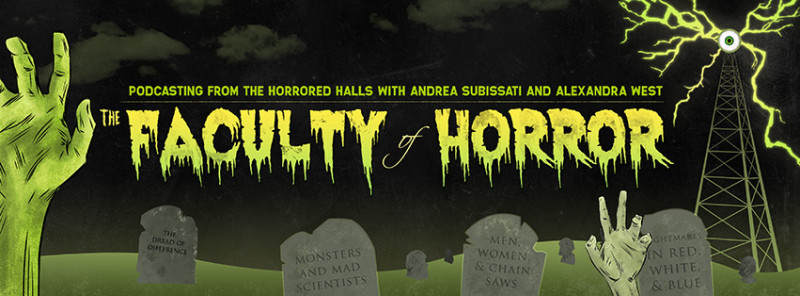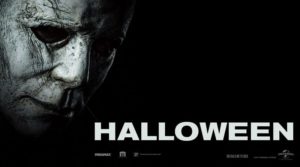It’s a funny thing seeing a film at TIFF’s Midnight Madness (the horror/genre programming section of TIFF). The audience is bananas. The energy is palpable and the audience participation is through the roof. At last night’s world premiere of David Gordon Green’s Halloween (2018), the audience was primed, Jamie Lee Curtis was in the house and various Michael Myers were stalking the Elgin Winter Garden venue. I’ve spoken about my love of slashers on this podcast multiple times and I’ve been on other podcasts speaking about my love for Halloween: H20 (1998) and why I think that film is a successful end to Laurie Strode’s story. I was trepidatious going in to the screening last night because I wanted to love the film, but I wasn’t convinced that Danny McBride and David Gordon Green were the team to bring something new to the franchise. I’m generally wary when a new team is brought in and says, essentially, “fuck the original franchise, we know better.” Gordon Green and McBride have made arguments in the press that the notion that Michael is Laurie’s brother isn’t as scary as some random guy killing people, to which I would like to say: fear is AHEM relative. BUT the mood was right last night and without further ado – let’s dive in to Halloween “2”018.
Set 40 years after the events of John Carpenter’s Halloween (1978) and ignoring all subsequent sequels and remakes the film begins on the eve of Michael Myer’s ill-advised October 30th transport from a psychiatric hospital to a supposedly Orwellian nightmare jail. Meanwhile, Laurie Strode (Jamie Lee Curtis) has been waiting for Michael’s escape and living in fear as a survivalist putting a strain on her relationship with her daughter Karen (Judy Greer) and granddaughter Allyson (Andi Matichak). Of course, the transport carrying Michael goes awry and he’s on the loose once again. Without the guiding principal of Laurie being Michael’s sister, hence his intent on killing her and anyone related to them, the film can’t decide on Michael’s MO – does he kill indiscriminately or like to wait for elaborate set ups to strike certain victims? Is his murderous rage triggered by the holiday itself, his mask, his older sister Judith or Laurie herself? Who knows? Certainly not the film. Halloween skirts the edges of saying something but then backs down in favour of comedy, creating a frustrating 90 minutes where characters speak in exactly their motivations and intents with no subtext but when the film could say something about trauma or lived experience it cuts to a goofy non-sequitur.
McBride and Gordon Green seem hell-bent on telling their audience that they have seen the original film but only through visual cues and mentions of the “Boogeyman” without context for what the “Boogeyman” means to the film, and I struggled to take away any meaning from it other than a celebration of nostalgia. I would be interested to know what someone who hasn’t seen the original film could take away from it as the film swings from one callback to another. As the filmmakers behind efforts like Pineapple Express (2008), Your Highness (2011) and Vice Principals (2017) Gordon Green and McBride can’t get out of their own way, insisting on injecting talky comedy every few minutes causing the film to flounder in its pacing and creating one of the most tonally inconsistently films I have ever seen. The film feels so indebted to these factors that it feels less like a film and more like an exercise. Filmed in mostly close-ups and medium shots I could never establish a sense of space to this new Haddonfield. One of the elements I appreciate most about Carpenter’s original is the emptiness of his new American small town, the notion that the place that was supposed to be the safest in America was also its most sinister.
On film Twitter, I’ve seen near universal praise for the film and its female led ending, and while I didn’t hate it, the film doesn’t earn it. There will never NOT be a day where I don’t want to see Jamie Lee Curtis be a badass and other women be badasses with her, but because the film spends so much time keeping these characters apart and deviating into subplots that go nowhere, the ending feels rushed and confused but hey, I got to see JLC cock a gun a few times.
I think nostalgia is a tricky thing, this film, which I’m sure will do very, VERY well and based on the reactions of those in the theatre around me and on Twitter, will be almost universally beloved, to me doesn’t understand what a threat like Michael Myers means today. There is talk about the original events but the filmmakers can’t quite bring themselves to take it into the realm of the violence, deadly tragedies (particularly from gun violence) that occur on a regular basis in America. McBride and Gordon Green seem to want to say that America’s violence hang-over causes people to become desensitized to lived violence until they themselves are faced with it. I’ve been watching the Netflix series Follow This about Buzzfeed journalist deep-diving into a variety of subject matters and one of the best episodes is about Black Survivalists, black folks who have taken it upon themselves to learn how to survive in unthinkable circumstances. The episode clearly lays out that for these groups they are not only marginalized but the government doesn’t care about their safety forcing them to take it into their own hands. Halloween once again skirts this issue with Laurie. What does Laurie’s self-imposed/forced survalist lifestyle say about our society? The film certainly doesn’t know or doesn’t want to say.
Prior to last night’s screening, there was a brief intro from the creative team then the lights went down and the audience cheered in anticipation of the film. The screen remained dark and the Halloween theme music began to play. From the side of the stage someone dressed in a Michael Myers costume walked on and stood there staring at the audience while a thousand or so phone cameras flashed. Then the music stopped and “Michael” unceremoniously wandered off stage. To me this “nod” to the audience indicated that the visual checklist of a Halloween film was more important than any illuminating thematic weight. Looking at this moment in retrospect, it felt like an arbiter of what was to come. Halloween 2018 believes in the iconography of Michael Meyers but doesn’t want to understand why he became and has remained a horror icon.



Sounds exactly like what I feared it would be. The trailers didn’t instill much confidence in me, and your review has pretty much reinforced that fear.
Of course, I’ll end up seeing it eventually.
This was a concern of mine as well. It seems like your review is suggesting the movie isn’t “bad” but more or less pointless. Which is how I feel about a lot of remakes/reboots in general.
Saw it last night. All I could parse was victims and killer being bound together by trauma (on four occasions Laurie occupies a space Michael took in iconic moments of the original). The older generation (the ’78 characters) alone can’t overcome it, they’re either withdrawn, killed or corrupted by it, but the three generations of Strode unite and emerge victorious. Anyway, I’ll have to see it again to check if this notion holds up.